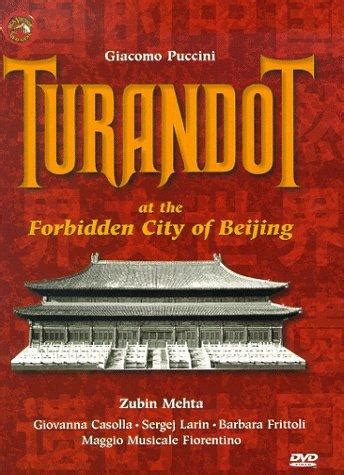Turandot
Turandot was Puccini's last opera. In fact, he died before it was completed -- that task being left to Franco Alfano. It premiered on April 25, 1926 in the Teatro alla Scala in Milan. Arturo Toscanini, a close personal friend to Puccini, conducted the premiere and part way through the final act, he laid down his baton, turned to the audience and declared, "Qui finisce l'opera, perché a questo punto il maestro è morto".
The second and all subsequent performances have used Alfano's ending.
A common tempest in a teapot is the pronunciation of the opera's title. The battle is over whether or not the final "t" is silent or enunciated. Citations for each abound and the concensus today is that either is accepted. Francophiles should reel in their indignation inasmuch as the origin isn't French, but rather, Persian. The origin stories reach back into antiquity of an Asian princess from a region called "Turan". Our princess was a daughter (dokht) of Turan.
Another item that deserves attention is why is the Princess Turandot so icy? A close reading of the libretto hints at it. There is a reference to an ancestress, Lo-u-ling, who was badly treated by a suitor. It turns out that she was raped and died. Because of this Turandot swears that no man shall have her. Cutting off the head of the prospective suitors --- I'd say that qualifies as agency.
Turandot is very well known for it's universally famous aria "Nessun dorma" (Nobody sleep). Every good tenor on the planet has sung it and half of those have recorded it. It was the most memorable part of the legendary "Three Tenors" concert at the 1990 World Cup in Rome. -- From the subline to the absurd -- Russell Watson, the pop/opera crossover recording artist tells of Irish pub patrons requesting it of him. "Oy, Russell, sing that there 'No One's Doorstep' song".
But as much as Calaf's heart-stopping aria thrills, it's unfortunate the audience members are in such ecstasy over the final "Vincero!" that they ignore the dramatic signficance of the following performance and arias from the servant Liu. The imperial soldiers among the crowds hear Calaf talking to Timur (his father) and Liu. The soldiers approach and demand they reveal Calaf's name. Liu finally admits she knows it but refuses to reveal it. They begin to beat her, but she grabs a soldier's dagger and impales herself rather than reveal the secret. She had always been in love with Calaf, and her serene death is a testament to that love.
Turandot at the Forbidden City, 118 min
Our presentation will be of the historic live recording of the 1998 production at the Imperial Ancestral Temple. It was the first time the opera was ever presented in China. Puccini's opera had been banned in China until this event. The relaxation was due in no small part to the efforts of Zubin Mehta who was very well known and respected in China.
Historical note: This Imperial palace is just across a grand avenue from the June 4th "massacre" in 1989 in Tiananmen Square



